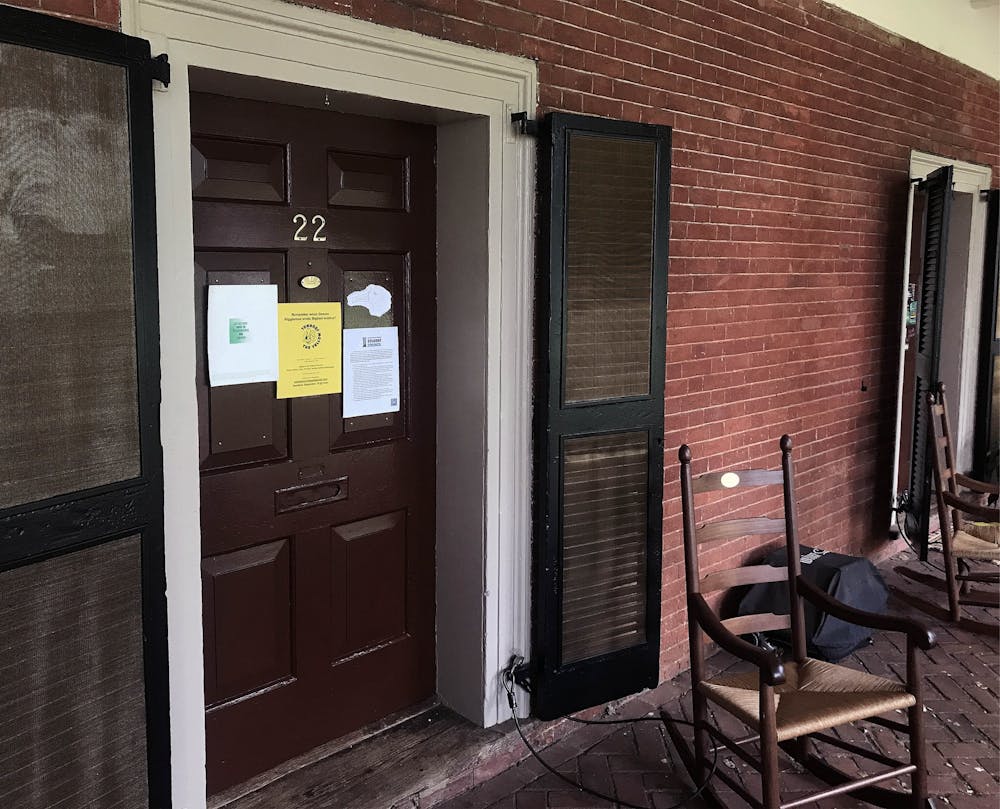Residents of the Lawn are criticizing the University’s new signage restrictions for limiting and censoring the ability of Lawn residents to freely express themselves on their doors.
The revised policy restricts residents to signage that fits within two message boards posted on each Lawn room door. It was implemented by Housing and Residence Life following controversy over large signs posted last fall and spring criticizing the University’s history of enslavement and inaccessibility. Previously, Lawn and Range residents were permitted to have one 1.5 ft by 2 ft pin board outside of their room for displaying paper materials.
“Last year, President Ryan pledged to review University policy on the display of signs on Lawn room doors and find a better balance between protecting the First Amendment rights of the student residents and preserving the unique and public character of the Lawn for members of our community and visitors from all over the world,” University spokesperson Wes Hester said in a statement to The Cavalier Daily.
Fourth-year College student LaNija Brown said the reduced size of the message boards is a way of silencing Lawn room residents.
“‘Free speech’ really means speech that upholds the good name of the school,” Brown said. “To me, this says that the University is scared to be held accountable by tourists, passerbys, students, etc. Holding tours all over the Lawn where one of the main talking points is how the school supports student advocacy — meanwhile [tour groups] have no idea they are literally surrounded with examples of U.Va. doing the opposite.”
Brown said the restrictions are “very hypocritical” given the Board of Visitors’ endorsement of a commitment to free speech last June. The statement “unequivocally affirms” the University’s dedication to free speech, pledging that all views, beliefs and perspectives should be considered without interference.
“The University is going to choose it's own reputation, regardless of what they claim to uphold,” Brown said.
The Foundation for Individual Rights in Education — a nonpartisan foundation which works to “defend and sustain the rights of students and faculty at America’s colleges” — is also disappointed with the University’s new policy, according to Laura Beltz, director of policy reform for FIRE.
“The new message boards policy places solely content and viewpoint-neutral restrictions on signs, which are permissible under the First Amendment,” Beltz said in an email to the Cavalier Daily. “Legally permissible or not, though, we’re disappointed to see the University limit this avenue for student expression.”
Like Brown, Beltz also noted that the revised signage policy for Lawn residents does not quite adhere to the University’s goal of affirming their commitment to free speech.
“Though this policy does not ban signs altogether, it certainly narrows students’ ability to express themselves on their message boards,” Beltz said. “We hope the University will reconsider the policy change.”
Joshua Franklin, fourth-year Engineering student and Lawn resident, said that while it is understandable that the University would not want some displays — such as misinformation — in “such a public space,” censoring Lawn students is not the correct approach to take.
“Throughout history, censorship has led to negative outcomes,” Franklin said. “Of course U.Va. would not want negative U.Va. messages on the Lawn, but since the person has a platform to share their opinion, that space should be encouraged.”
Alex Moreno, fourth-year College student and Lawn resident, also expressed his dissatisfaction with the new policy.
“While it is understandably undesirable for the U.Va. administration to allow signs on Lawn room doors that are critical of the University, I don’t think that the current restrictions are the right venue to pursue,” Moreno said. “Restricting the size of the messages instead of restricting the contents of the messages on the doors seems to serve really no good purpose for either the University or for us Lawn residents.”







